The whaleboat in which Vineyarders out-pulled all others who met them here and elsewhere, has been presented to the Dukes County Historical Society by Captain Isaac Norton of Vineyard Haven, commander of the craft, George Smith of Oak Bluffs, the only surviving member of the crew, and Captain Norton’s nephews, Benjamin, Frank, Orrin and James Norton. The historic craft has been stored in the barn of Cyrus Norton, brother of Captain Isaac, for more than thirty years. It was last used in an historical pageant at Lake Tashmoo. The boat is an object of veneration to all who recall whaling days and the deeds of daring performed by whalemen, and its gift to the historical society dispels the fear that some day the famous craft might be broken up by some unsentimental person who lacked knowledge of her history.
Vineyard whalemen were famed wherever men pursued Leviathan in the palmy days of industry. A race of captains who commanded the ships of many ports, winning fame and fortune for those places, the Islanders revealed their innate skill as sailors and boatmen as soon as they went afloat. And, working their way aft from the hawse-pipe, as was the preferred custom of the time, all took their trick at pulling an oar in a whaleboat.
Oarsmen Had Strong Backs
Just when whaleboat racing began no one on the Vineyard knowns, and it is doubtful if any record would give this information. For boats’ crews raced at sea and in various ports where ships touched. And when they had arrived home once more, the thrill of “lifting a boat out of water” seems to have called them from such occupations as bound them to the land. Not all the whaleboat men were whalers. They were simply good boatmen and possessed of strong backs, but it was the whalemen who called them out and put them on their mettle, and there were whalemen in most of the crews.
New Bedford had whaleboat races in the Acushnet River before the Vineyarders entered into the sport, and cocky winning crews visited the Vineyard, talking about racing, and extending an invitation to the Island boys to “launch and try out.” This offer was accepted, and some hot races took place off Oak Bluffs and elsewhere about the Vineyard, regulation whaleboats being used, boats that had made a voyage or two at sea.
It was this fact that influenced the Vineyarders to built their own boat, and the order was duly given to Urian Morse of Edgartown. Some slight changes in her lines were suggested, and these were carried out by the builder, resulting in a slightly lighter boat and possibly in greater speed. Some of these changes were made possible because the Vineyard boat was not intended to be used for whaling, nor for being stowed on davits,
The original crew which manned this boat was made up of Captain Isaac Norton, Cyrus Norton, his brother, who pulled the bow oar, George Smith, Allen Mayhew, John Gordon and Julius Lutz, all selected for their skill and brawn. Each man owned a share in the boat, as each had contributed toward the cost, and their pride in the craft was great indeed. One of the first resolutions this crew made was that the boat should never touch the ground. It was not the though of possible dishonor that inspired this resolution, but the fear that sand or gravel might mar the slick surface, sandpapered to a glossy finish and then coated with black lead. The resolution was kept to the end, the boat never resting on soil. When she was hauled out on the mainland for examination or leading a float was used, and when she was taken from the water at home, she was picked up and carried bodily.
In this boat Captain Ike and his crew met all comers, and visited the mainland where they defeated every crew that raced with them. The speed they attained in this boat is a matter that Vineyard boatmen still mention with awe, and so is the practice of Cyrus Norton of snapping his oar in two at the conclusion of each race.
The Vineyard crew soon gained the reputation of being invincible, and this was the ultimate cause of the discontinuance of whaleboat racing. For each time that a race was announced, the Islanders appeared and won, until the entries became fewer and fewer. New Bedford, the “Whaling City” whose whalemen were for the most part born somewhere else, was the last to withdraw, and this occurrence was more spectacular than the retirement of any other crew since it was a downright refusal to race. The race had been planned for a certain day, to take place in New Bedford. The Vineyard crew was on hand, its boat hauled out on a float in the river according to custom. But when the hour arrived, the New Bedord crew absolutely refused to race with the Vineyarders, and the latter manned their oars and came home, never to race again.
The Vineyard, therefore, claims the whaleboat championship, and this honor was won in the old boat now presented to the historical society. And Captain Norton, four score years of age and more, but erect as a ramrod, tells the tales of the exploits of himself and his crew with all the zest of an undefeated champion.






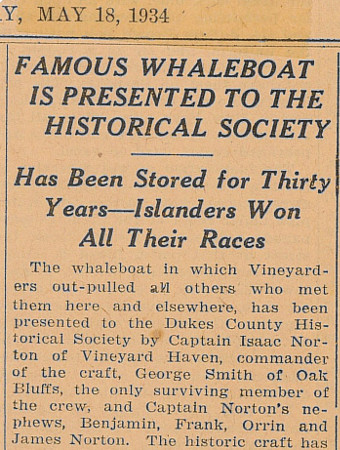
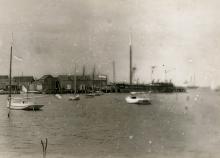
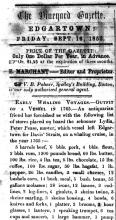

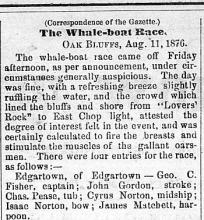
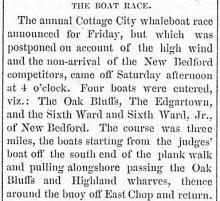
Comments